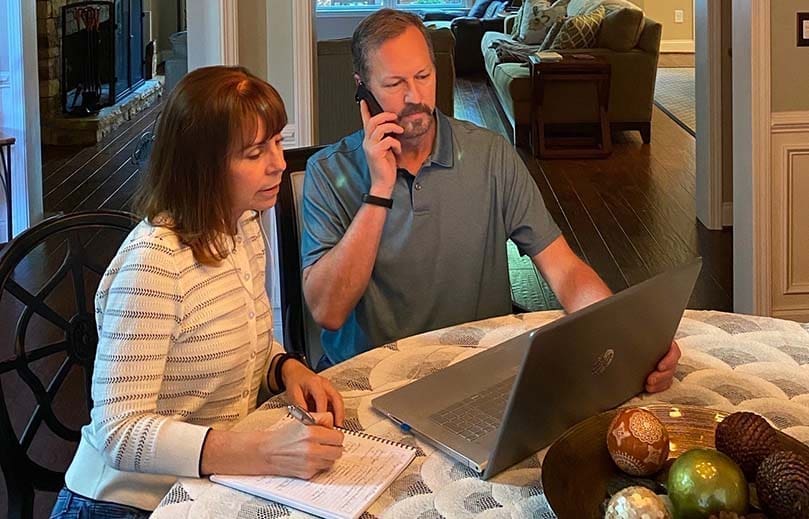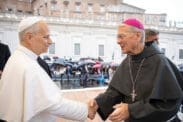
Atlanta
Priests, lay faithful look ahead to 2021
By MARK WOOLSEY, Special to the Bulletin | Published January 7, 2021
ATLANTA—Father Brian Sheridan has a Ziggy cartoon tacked up on his office door at St. Thomas the Apostle in Smyrna.
It’s a departure from the strip’s usual positive tone and whimsical humor. A bemused Ziggy is wearing the kind of expression you’d expect after gobbling a load of sour candy. It reads, “They say hindsight is 2020…I can’t wait to see 2020 behind me.”
The faithful of the Archdiocese of Atlanta have reason to cheer the calendar’s turn, after a year of pandemics, politics, protest and economic stress. But there’s also a sense of working to attain perspective on 2020 coupled with reflection on the takeaway and a resolute forward gaze. The word “hope” has been invoked a great deal in the face of many challenges, ranging from repeatedly having to alter worship plans to restructuring church events to worries about budgets to heightened counseling and outreach.
Father Sheridan said closing in-person services in the face of COVID and grappling with upgrading their livestream capability was “terribly upsetting” but the stress has diminished as they head toward a new normal. It’s been a bumpy road in the meantime he indicates, as he came down with COVID twice and an aunt died.
Analyzing 2020 from a Christ-centered perspective, he says “certainly has helped me to be more educated on what it means to say ‘Black lives matter’ and provided insight into what Jesus is asking of us in making decisions politically. And certainly we recognize there’s a big divide politically in our congregations.”
Responding to the protest movements and doing some self-examination led to formation of a social justice committee at Blessed Trinity High School in Roswell, said Principal Cathy Lancaster. She said the group has been discussing how to increase diversity among the teaching staff. She also said that some teacher education work is underway.
Father Jeffery Ott of Our Lady Lourdes Church in Atlanta took a historical tack. He said there are many parallels between today and the time of Jesus’ birth—political upheaval, distrust in institutions, growing ranks of the homeless and family issues—not the least in Jesus’ own family.
An important takeaway from all this, he said, is for Catholics to persevere and have hope, and look upon the year’s troubles as an opportunity to strengthen one’s faith and focus on Christ.
Centering on what’s important
Faith, set against a background of fear and caution has been a touchstone for Eddy and Kate Herty, members of St. Catherine of Siena Church in Kennesaw. Eddy’s job moved from frequent travel to working at home. That gave a big assist to Kate’s homeschooling. The family gave up many social activities, but said having their church reopen for mass was a “huge gift.”
And as horrible as the pandemic has been, “it’s been a blessing to not have as many outside distractions. It helps to center us more on what’s really important and forced us to strengthen our family’s faith,” said Kate.
Faith and family have indeed come together in a substantial way, said Andy Lichtenwalner, director of formation and discipleship for the archdiocese.
Some parishes and families were already doing faith formation activities in the home, he said, but others are now embracing it. He said an earlier survey indicated at least 40 parishes in the archdiocese had such programs ongoing. He said that grew in 2020 with the institution of the Families Forming Disciples program, incorporating both virtual and in-person meetings in tandem with family activities.
As he put it, “this year has invited us to grow in terms of family prayer.”
From a purely dollars and cents standpoint, officials across the archdiocese have seen challenges as well. Our Lady of Lourdes made its budget and avoided layoffs. Giving has remained solid there. But, St. Thomas the Apostle was forced to let go of its preschool staff.
At the St. Vincent De Paul Society of Georgia, CEO Patrick McNulty, who came to the job in September, said individual, corporate and foundation giving all increased as did service levels and the need for operational changes. Switching from a food pantry model to home delivery of food aid was one. Providing CARES Act aid was another.
He thinks the year’s rollercoaster nature may have inspired a mental pause, more reflection and being “more intentional about the need to give back and work together.”
Priests said 2020’s increased isolation and stress led to a rise in the need for spiritual counseling.
Father Ott, at Lourdes, said depression, anger, frustration and exhaustion were common themes.
At St. Thomas the Apostle, Father Sheridan saw parents also bringing their youngsters in for sessions. He’s helped younger parishioners put things into perspective.
Lancaster at Blessed Trinity remarked on the resilience of youth.
Coming off a shutdown and switch to virtual learning this spring, the student body took seamlessly to masking and social distance requirements, she said. And although some events like prom and graduation ceremonies were canceled, other mainstays like football games and a Christmas concert went forward.
“Twenty years from now I think it will have taught the class of 2020 how strong and resilient they were,” she said. For her, lessons of the year included becoming still and listening.
“I’m very hopeful for 2021. I’m looking for our country to be unified because we’ve been through a lot together,” she said.
Unity is also a key word for Father Fernando Molina-Restrepo at Transfiguration Church, Marietta, who says 2021 should be a year of building on an already strong community. He says the parish did well in quickly pivoting to online Masses and events, then bringing live worship back later in the year with appropriate safeguards.
The Hertys say, looking ahead they want to be more committed to charitable causes.
“There’s so much out of our control and really the only thing in our control is our prayer and our actions,” said Kate.
Lichtenwalner also has an optimistic view of the road ahead, and wants a focus on lessons learned in 2020 to be “deeper than simply making do in a pandemic. They are issues with strategic and long-lasting importance as we look at how we do faith formation and evangelization effectively.”
He says there will be a need to be more strategic in how the church commits its resources and utilizes them.
